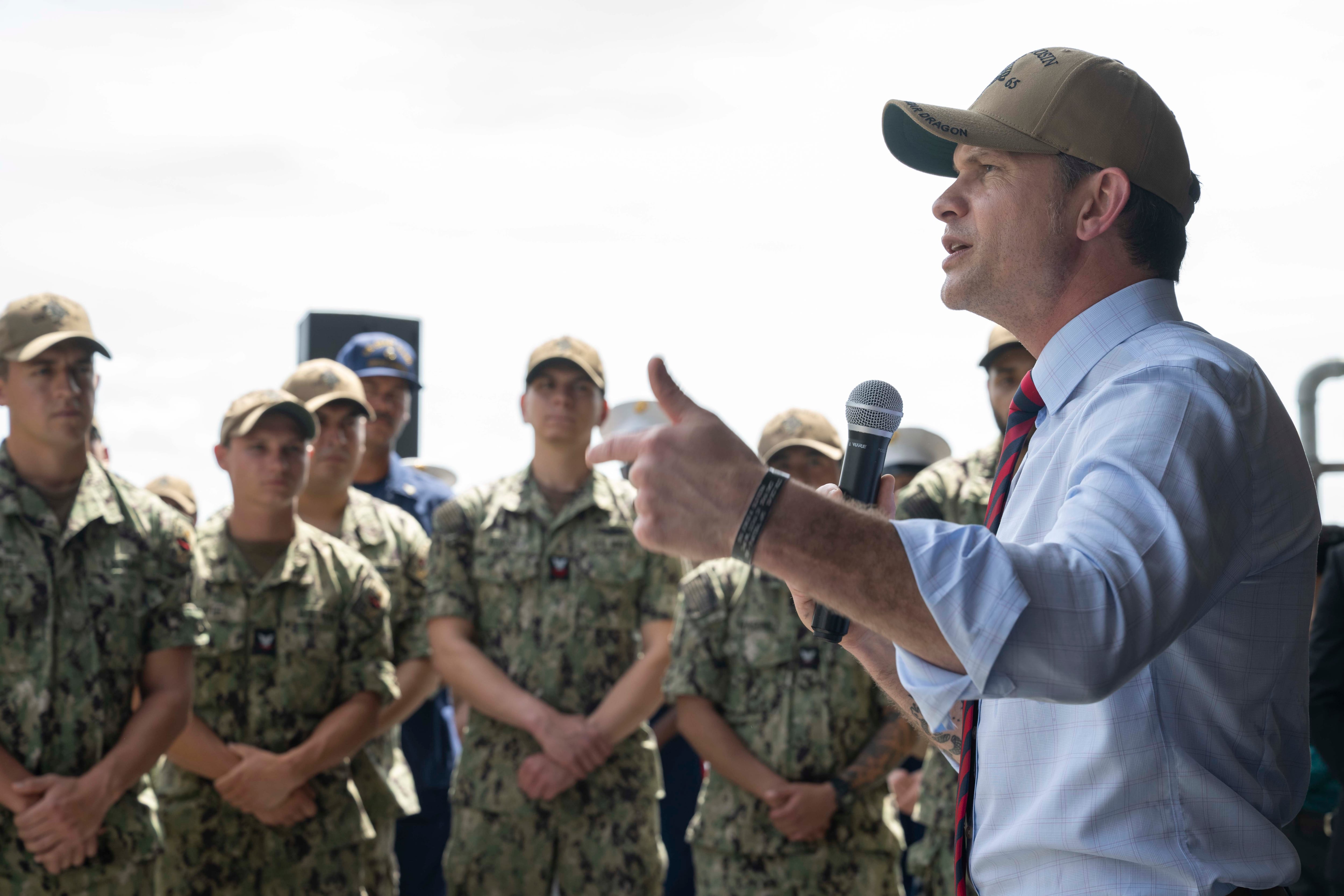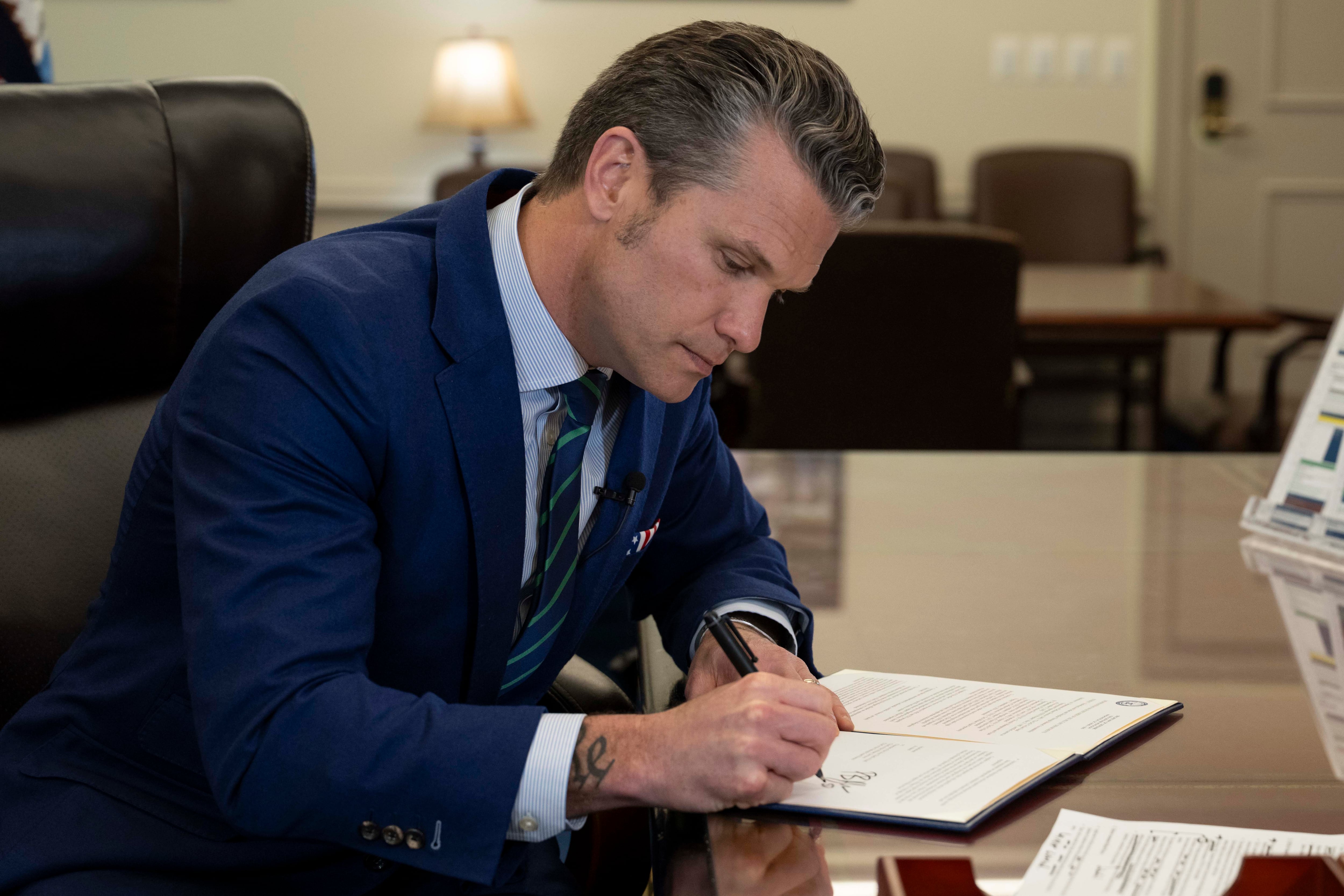The top enlisted Marine wants to arm his enlisted personnel with broader professional education and bring back a common skills test to assess their warfighting ability.
Sergeant Major of the Marine Corps Ronald Green and his advisers also are seeking more input from the fleet Marine Corps on opportunities to serve in special duty assignments like embassy security, recruiting stations and the drill instructor billets.
These recommendations, along with proposed changes in pre-deployment training, professional military education, evaluations and special duty assignments and more, were generated at the 2016 Sergeant Major of the Marine Corps Symposium in August.
In September, Green presented the group's final recommendations to the commandant, and later discussed the proposals with Marine Corps Times.
"I won't say that everything here will happen, because now it goes to the commandant," Green said. "We continue to discuss it. Some of these topics are not complete. We've made the proposals but there's work that we need to do, as a body, to make some of these things happen."
On Sept. 7 and Oct. 7, Green laid out the vision senior enlisted leaders have for the Corps in separate interviews with the publication. The following excerpts have been condensed for space.
Q. What recommendations came out of this year's symposium about advising Marines on life after the Corps?
A. We looked at the personal transition readiness program and we looked at the transition readiness seminar for those getting out.
What we're saying is: OK, when do we really start to transition Marines? We only keep one out of four or five Marines. About 35,000 Marines got out of the Marine Corps this year and about 35,000 came in the Marine Corps.
If we're going to transition, let's say, three out of four Marines, when should the transition process start? We think we should introduce them to transition in the pool when we're recruiting them – start to talk about service and transition – because we know all Marines are not going to stay and we can't afford to keep all of them.
Then when they get to recruit training, have another conversation about service and transition, because either they're going to continue to serve or they're going to transition out.
Then at the two-year mark, before they get out, that's when we really get into the conversation of: OK, you need to start making up your mind whether you are going to stay or whether you plan to get out. By the way, we try to identify high-quality Marines about that point.
At the three-year mark, the CO sits down and has a conversation about whether that Marine is going to stay – whether they plan to stay in or whether they plan to get out.
So in helping them make that plan in the past … it was a conversation to be had at the one-year mark prior to the Marine getting out. Now we start that conversation when we bring that Marine in, to educate them more on what service is all about and how to properly transition.
Q. Can you talk about how the symposium's review of pre-deployment training?
A. The information we studied is simply for overview for the units. We just looked at what we're doing, which has led to another conversation that the commandant is having about exploring getting back to our Marine Corps common skills, the common skills that we used to teach in the Marine Corps. There was a testing process we had, where every Marine would do a practical application and a written test, up to a certain grade -- E-7 for enlisted.
Everybody would take this test, a written test and a practical application test, about Marine Corps common skills, and that's just the basics of being a Marine. It would cover history, leadership, warfighting, the whole gamut.
The practical application part would be: Go and clear your gas marks in a timely manner; you have to find and carry someone for a distance in a certain amount of time; you have to name the three parts of a grenade – that type of stuff.
So now we're looking at getting back to that but with an updated curriculum.
Q: How effective is current pre-deployment training?
It's very effective because we've utilized it over the last 14, 15 years. We're still utilizing it for units that deploy. We just want to make sure that we're doing the right types of training for deployments now and looking at combat in the future.
The global view of who we're going to fight, where we're going to fight, that's determine by the enemy. That's always evolving.
Q: What possible changes to enlisted professional military education were explored?
We were looking at what officer PME would compliment the PME we have now that staff NCOs go to. The sergeants major and master gunnery sergeants, we attend the Marine Corps Command and Staff College course. so the question was: Are there any other officer PME courses that we would benefit from to help the team? That's one that is not final because we have to break down the curriculum for the warfighting curriculum. We have to break down the curriculum for amphibious warfare – that's another one.
[Expeditionary Warfare School], where captains and the majors go, we were looking at whether it would benefit us to send master sergeants and first sergeants to that course. So we've got to look at the curriculum, compare the curriculum, see what's in there that we could benefit from and how would that staff NCO return then to the Marine Corps.
What would be the benefits to the Marine Corps from staff NCOs going? I guess that's more so the question: What and where would the Marine Corps benefit from staff NCOs going to officer PME? And it's [would not be] all staff NCOs. This would be a select few staff NCOs. That's still being explored.
Q. What possible changes to the enlisted evaluation system were discussed?
A. We talked about how we grade our sergeants and above in fitness reports.
We talked about the proficiency and conduct systems we grade by. Are they effective today? Do we need to make any changes to those programs?
With the senior enlisted evaluations, we're looking to possibly make some changes, to possibly revamp the way we evaluate senior enlisted Marines at the E-9 level.
Q: What are some of the changes you are looking at for evaluating E-9s?
A. Just the paperwork, the evaluations system. Not so much marking us with letters; more so painting the picture – the intangibles about us – defining those intangibles more so and painting the picture for that leader.
Q. What changes were recommended about how Marines are selected for special duty assignments, such as drill instructors, recruiters and Marine Security Guards?
A. Over the last 14 years, during the fight, we had to make As on the battlefield. That's absolutely correct. We have to make As or we lose Marines. In the process of making those As, we didn't take our eye off the bubble, but we didn't focus as much, we didn't put as much focus on our special duty assignments. We're starting to … revamp the system of how we select Marines to go out and do those billets.
[We are] proposing to allow the units to have more of a voice in what Marines they feel are qualified for which billets; allowing the Marines to have some say. Asking the Marines: What do they think they're better qualified for?
And starting that conversation before the Marine is supposed to go out on a billet. So shaping Marines to go out on these billets.
Q: The theme of this year's symposium was 'Protect What You've Earned.' Can you talk about how that was discussed?
A. 'Protect What You've Earned' is not a program. It's a way of thinking that the commandant has directed the Marine Corps to take, to look at everything we've earned in our families, in our lives, the things that are positive in the Marine Corps.
He talks about the day we earn our eagle, globe and anchor for the first time in the Crucible; the day a young lieutenant earns their gold bars at OCS or whatever program they go through.
He asked us to reflect on that and not do things that will tarnish the things that we've earned or have them taken away from us.
When I talk to Marines, I talk about: You have two names on your breast pockets. You have one on your left breast pocket and one on your right breast pocket. One we swore into and the other one we were born or we married into. So when I talk to Marines, I talk to them about protecting those things that we've earned.
We've earned the right to be called 'Marine;' to be a part of the Marine family. We've earned families. We've earned the right to wear the uniform. We need to protect those things.





